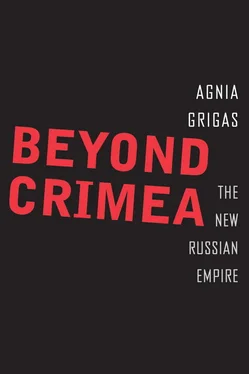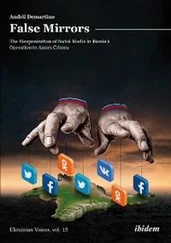The official usage of the term “compatriot” arose only after the dissolution of the Soviet Union, in early 1993, when it was employed by the Ministry of Foreign Affairs and other government departments. 5There is no evidence that the term was ever used with the same political connotations during the Russian empire or during the Soviet era. As Great Soviet Encyclopedia entries show, until the 1990s the term sootechestvennik was nothing more than a Russian version of a French word compatriote (fellow countryman/countrywoman). 6According to the entry in the 1955 edition, which also cited Lenin’s use of the term, sootechestvennik was used as a translation of the Latin word patriota (meaning exactly “compatriot”). 7Joseph Stalin used the word sootechestvennik with exactly the same meaning in his Victory Speech following Germany’s surrender in 1945. 8But neither Lenin nor Stalin used the term with the same political connotation that it increasingly gained in the 1990s.
This politicized and securitized concept of “compatriot,” and certainly the notion of protecting one’s compatriots (rather than one’s citizens) who reside or are even citizens of foreign states is somewhat unusual in the global context, but not unprecedented. For instance, while Israel offers citizenship to Jews in general, it encourages them to return to the motherland rather than seeking to protect them abroad. Likewise, during the American invasion of Grenada in 1983, President Ronald Reagan argued that one of the motives of the operation was to protect American medical students on the island. Romania, Hungary, Croatia, Serbia, and other countries have also pursued policies of support toward their diasporas. From the mid-1990s on, these countries offered benefits in various degrees in such areas as education, employment, and welfare not only to their compatriots, but also to passport holders, or in the short-lived case of Hungary, to identity card holders. 9Though these policies have attracted significant criticism on the grounds that they were intended to undermine the sovereignty of neighboring states, they have largely paled in comparison to the compatriot policies practiced by Russia. 10The sheer comprehensiveness, consistency, and tenacity of Russia’s compatriot policy place it in a league of its own. To be sure, I do not argue that any policy to support one’s compatriots is automatically illegitimate. Countries can call for other states to respect the human and civil rights of their conationals or other peoples. Diplomacy can be used to achieve such aims. Financing cultural and educational programs are also commonly used measures. But it is crucial to distinguish different forms that such policies can take—launching cultural television programs cannot be equated to sending in tanks. Using the pretext of compatriot protection to move in troops or refuse to withdraw them falls outside the scope of diplomatic or cultural initiatives. In some regards, Russia’s compatriot policies are more reminiscent of postcolonial policies, which suggest the imperial nature of the Soviet Union and the neo-imperial fallout from its collapse. For example, when India gained independence from the British Empire in 1947, Indians remained British subjects until 1950. Subsequently, some individuals who did not obtain Indian citizenship maintained a status of “British subject without citizenship.” However, unlike in the case of Russia, these categories were clearly and legally defined by mutual agreement between India and Britain. 11
In part the uniqueness of Russian compatriot policies in contemporary times stems from the scale of the issue and the nature of the Soviet empire, which had displaced, deported, and colonized sizable populations of different nations. Overnight with the fall of the USSR, Russia lost some 25 million ethnic Russians and additional Russian speakers to foreign states. These people had been citizens of the Soviet Union. Since Russia was the official successor state of the Soviet Union, accepting all of the Soviet Union’s former obligations, it made sense that Moscow would also take responsibility for the Soviet-era Russian migrants and deportees of all ethnicities to Soviet territories that stretched from the Baltic Sea to the Central Asian steppes. The situation was complicated by the fact that some newly reestablished states like Estonia and Latvia failed to automatically provide citizenship to Soviet-era migrants, while interethnic conflict emerged in Georgia, and some Central Asian states like Uzbekistan embarked on nation-building that favored their titular majorities. As a result, some members of the Russian diaspora were left without any citizenship. The situation was made more complex by the fact that the Soviet-era Russian or Russian-speaking migrants were a highly diverse and fragmented group, many of whom had no desire to return to the motherland as they had developed strong ties to their countries of residence or had few ties to the Russian Federation. As this chapter will demonstrate, in the 1990s Russia was facing its own economic difficulties, and was not in a position to assist their return. Instead, Moscow cast them as compatriots.
Previously Moscow’s compatriot policies have been studied as a form of soft power and the humanitarian dimension of foreign policy. 12In contrast to coercive power, soft power aims to gain influence through appeals to cultural and historic affinities and shared values. 13While it has been recognized that Russia uses compatriots for geopolitical influence, 14the full significance of these policies outside soft power has not been grasped. 15Likewise, the humanitarian dimension of Russia’s foreign policy has been viewed as outside the scope of military or economic sanctions. 16However, Russian compatriot policies have evolved to be and thus should be understood as a strategic tool of foreign policy and geopolitical ambitions. 17Compatriots were an important element of Russia’s Foreign Policy Concept of 2000 and reiterated in the updated Concept of 2013, and they are at the crux of Russia’s reimperialization policy. As noted, the definition and the concept of “compatriots” are not fixed, but they are also linked as much to the individuals themselves as to Russian national identity and Russian foreign policy. In any case, the central proposition of this book is that Russia’s humanitarian, compatriot, and soft power policies have become increasingly enmeshed with its territorial aims and military tactics.
This chapter will trace this most important phase and component of reimperialization trajectory. Moscow’s policies and legal framework toward its compatriots emerged rather incoherently in the 1990s. By the 2000s, however, the legal and policy framework took a decided turn and compatriot policies were coupled with the Russian government’s geopolitical and increasingly revisionist aims. A brief review of Stalin’s ethnic policies, which helped create sizable Russian and Russian-speaking minorities in the post-Soviet space, will provide historical context. The evolution of definitions of the term “compatriot,” and the development of related policies, will then be traced from the presidency of Boris Yeltsin to the rule of Vladimir Putin.
In the 1930s Joseph Stalin laid the foundations of what would result in large numbers of Russians and Russophones residing in territories from the Baltic Sea to Central Asia. The Georgian-born robber-revolutionary turned leader-dictator spent his life trying to be more Russian than the Russians themselves despite his heavy Georgian accent in Russian and his distinctive appearance betraying his Caucasian roots. 18He did not trust the loyalty of the different nationalities of the Soviet Union and in the end sought to eliminate or Russify them. Many of his policies resulted in deporting various nationalities from their native countries into other parts of the Soviet Union and importing Russian workers to create ethnically mixed populations. As American historian Timothy Snyder has argued, Stalin took a different course in ethnic policies from his predecessor Lenin and other Bolsheviks. 19Stalin did not believe in positive discrimination in selecting non-Russians for the project of building the Soviet Union (though he himself had been selected and favored). He was searching for tools to consolidate Soviet society ideologically and find a basis for its common identity. Stalin perceived nationalism, especially in other Soviet nations, to be a threat to Bolshevism. 20Therefore, promoting the Russian language and culture together with the idea of Russians being “first among equals” in a “friendly Soviet family of nations” was meant to create a sense of unity in the Soviet state.
Читать дальше












